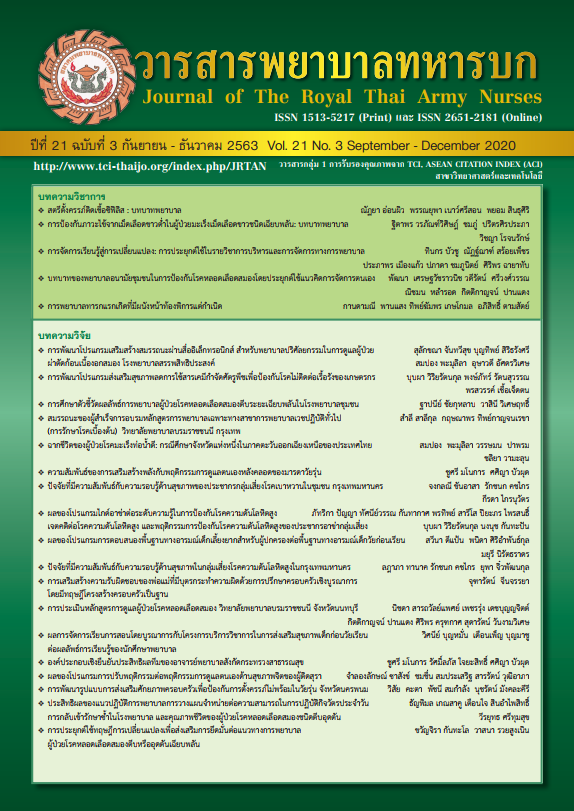The Effects of A Behavioral Modification Program on The Mental Health Self-Care of Persons With Alcohol Dependence
Keywords:
alcohol dependence, psychosocial rehabilitation, behavioral, harm reduction modification, mental healthAbstract
The purpose of this quasi-experimental design was to examine the effects of a behavioral modification program on the mental health self-care of persons with alcohol dependence, and was divided into two pre-posttest groups. A research sample of 62 alcohol-dependent patients in the out-patient unit at four District Health Promotion Hospitals of Srisaket province in Thailand were randomly assigned to experimental and control groups, with 31 subjects in each group. The experimental group participated in the behavioral modification program for eight sessions weekly, 2 hours per each session, and the control group received regular caring activities. The research instruments were the following: 1) A personal data questionnaire; 2) a behavioral modification program; and 3) a mental health self-care scale. The behavioral modification program was validated for content validity by 3 professional experts and the mental health self-care scale had a Cronbach’s alpha coefficient reliability of .97. The demographics were analyzed using descriptive statistics. A comparison of the mean score for the mental health self-care between the pretest and posttest for the experimental and control group was analyzed using dependent t-test. Further, an independent t-test was used to examine the mean difference between the pretest and posttest mean score for the experimental group and control group. The research findings were as follows: 1) The mean score for mental health self-care on the posttest (M = 199.64, SD = 17.60) for the experimental group after participating in the program was significantly greater than their mean score on the pretest (M = 173.39, SD = 21.40) before participating in the program (t = 7.30, p<.001). 2) The mean difference in the mental health self-care mean score between the pretest and posttest of the experimental group ( = 26.55, SD = 20.25) was significantly greater than that of the control group that received regular caring activities (
= .29, SD = 4.53) (t = 7.05, p<.001).
As a result of this study, it can be concluded that this behavioral modification program can enhance the mental health self-care of alcohol-dependent persons. The findings suggest that future study should continue investigating this program with groups experiencing hazardous or harmful alcohol consumption and amphetamine addiction and should be assessed for its continuous effectiveness and sustainability.
Downloads
References
Kusreesakul K, Kittirattanapaiboon P, Makka N, Bundhamcharoen K. The burden of mental and alcohol/substance use disorders in Thailand 2014. J Ment Heal Thail. 2018;26(1): 1-15. (in Thai)
Ross R, Stidham AW, Saenyakul P, Creswell JW. Intimate partner violence, emotional support and health outcomes among Thai women: a mixed methods study. J Royal Thai Army Nurses. 2015;16(1):22–32. (in Thai)
Julawong O. Exploring risky behaviors related to HIV infection in Thai Army Conscripts. J Royal Thai Army Nurses. 2013;14(3):142–150. (in Thai)
Jirapramookpitak T. Mental health gap and related economic burden : a longitudinal community survey. Faculty of Medicine, Thammasat University. 2015. (in Thai)
Pathayanant N, Ratniyom A. An analysis of economic costs of drug abuse treatment at Thanyarak Institute. J Med Heal Sci. 2011; 18(1):8–20. (in Thai)
Bernardin F, Maheut-Bosser A, Paille F. Cognitive impairments in alcohol-dependent subjects. Front Psychiatry. 2014;5(JUL):1–6.
Aroonrattanapong R, Charnsil C. Prevalence and Associated Factors of Depression Awareness in Patients with Alcohol use Disorder at Maharajnakorn Chiang Mai Hospital. J Psychiatr Assoc Thail. 2017;62(1):27–34. (in Thai)
Phajuy A, Sriburapar N. Psychiatric Comorbidity of Alcohol Dependent Patients Admitting in Chiang Mai Drug Dependence Treatment Center. J Psychiatr Assoc Thail. 2009;54(1): 63–74. (in Thai)
Niyakit S. Prevalence , Drinking Behavior and Household Expenses of Alcohol Drinking of the Population in Tambon Rainoi , Muang District , Ubon Ratchathani Province. J Off DPC7 Knon Kaen. 2012;11(1):21–32. (in Thai)
Waleewong O, Thamarangsi T, Jankhotkaew J. Alcohol‘s harm to others in Thailand: concept, situation and gap in knowledge. J Heal Syst Res. 2014;8(2):111–119. (in Thai)
Maremmani I, Cibin M, Pani PP, Rossi A, Turchetti G. Harm reduction as “continuum care” in alcohol abuse disorder. Int J Environ Res Public Health. 2015;12(11):14828–41.
Panya P, Sethabouppha H, Jormsr P. Experiences of relapse among elderly with alcohol dependence. Nurs J. 2013;40(4):45–55. (in Thai)
Viwangshu P, Ratanubol A, Boonprakob P. Development of a transformative learning model for alcoholic rehabilitation treatment. SDU Res. 2013;9(2):217–31. (in Thai)
Knowles M S. Self-directed learning a guide for learners and teachers. Englewood Cliffs, NJ: Cambridge; 1975.
Jitrajinda S, kanha S. Children cognizant Thailand advertising trick against children. Bankok: Pimde; 2005. (in Thai)
Takpho A, Somprasert C, Imkome E. The effects of a self-help group program on the mental health self-care of schizophrenic patients’ primary caregivers. J Nurs Heal Care [Internet]. 2017;35(3):109–19. (in Thai)
Somton S, Aungsuroch Y, Suktrakul S. The Effect of Psycho-Education Combined with Social Media Program on Symptom Severity of Persons with Bipolar Disorder. J Royal Thai Army Nurses. 2019;20(1):252–60. (in Thai)
Hill L & Smith N. Self-care nursing: promotion of health second edition. New jersey, Prentice-Hall;1990.
Burns N & Grove SK. The Practice of Nursing Research Conduct, Critique, & Utilization. W.B. Saunders and Co., Philadelphia;1997.
Kanokchanya P, Uthis P. Effects of brief intervention program using integrated motivational interviewing and cognitive behavioral restructuring on depression and alcohol consumption among alcohol dependence. J Psychiatr Nurs Ment Heal. 2013;27(2):56–68. (in Thai)
Saardiem W, Pumprawai A, Rongmuang D. The effects of the modifying smoking behavior program of working men in Chaiya District, Suratthani Province. J Grad Res. 2016;7(1):85–100. (in Thai)
Rurob U. Coping skill training and cue exposure therapy for alcoholic patients at Nakhonratchasima Rajanagarindra Psychiatric Hospital. Khon Kaen University; 2010. (in Thai)
Downloads
Published
How to Cite
Issue
Section
License
บทความหรือข้อคิดเห็นใดใดที่ปรากฏในวารสารพยาบาลทหารบกเป็นวรรณกรรมของผู้เขียน ซึ่งบรรณาธิการหรือสมาคมพยาบาลทหารบก ไม่จำเป็นต้องเห็นด้วย
บทความที่ได้รับการตีพิมพ์เป็นลิขสิทธิ์ของวารสารพยาบาลทหารบก
The ideas and opinions expressed in the Journal of The Royal Thai Army Nurses are those of the authors and not necessarily those
of the editor or Royal Thai Army Nurses Association.






